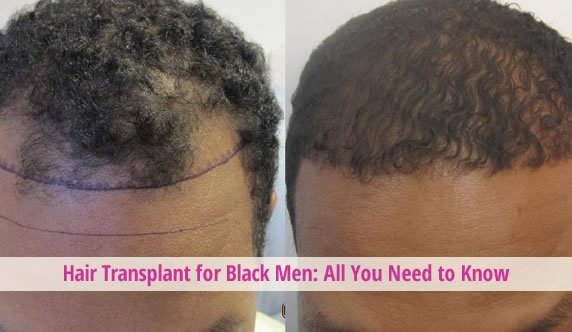(ThyBlackMan.com) Which misconception have you heard about hair transplants for African Americans? Does it even work? Naturally, a hair transplant is a restoration method that’ done to add more hair to a balding area on the head. Globally, approximately 40% of the male population report noticing hair loss by the time they approach 35. This number sharply increases to about 65% by the time they reach 60 years.
Many have turned to over the counter products to save them from this misery. Sometimes it works. But many times, it fails. Remember those guys with huge, unappealing scalps, whose transplants failed to match the expectations? Or the second group whose transplants look cool owing to the successful procedures they had? Either way, you might have heard a thing or two about hair transplants.
If you are looking for a hair restoration procedure that gives amazing results, you may want to seek professional advice. But just don’t do so without reading this guide. In this post, we are going to answer one of the web’s most searched questions about hair transplants, does it work for African Americans? Let’s find out shortly.

Does Hair Transplant Work for African Americans?
Contrary to many people’s opinions, hair transplant works for the African American population. Hair transplant procedures are available to all clients, the ethnic race notwithstanding. This can be attributed to the fact most of the procedures such as FUT and FUE always involve the natural hair as the donor material.
For some reason, different patients will pose different challenges when it comes to hair loss and the African American group is no exception. For this group, the popular curly follicles can be viewed as an advantage and disadvantage.
For instance, with this hair type, it’s easy for the surgeon to cover a large area without necessarily using many follicular grafts. Also, the curly follicles make it easier to create a natural hairline because this is exactly what most of the individuals already have even before the actual transplant is done.
FUT or FUE: Which is the Best?
Usually, the choice of a hair transplant procedure depends on a wide range of factors and preference is just one of them. For African Americans, the decision will be based on a variety of issues including the characteristics of the client’s hair loss.
One may argue that FUT is the most popular option for this group because they have curlier and thicker hair follicles. This ensures the surgeon can complete the operation by covering a larger part without necessarily having to tamper with the roots of the extracted follicles.
However, a different version states that FUE is the most suitable option for African Americans because it allows for the grafting of the follicular units as single elements, which makes it easier to justify the root curvature and viability of the procedure. African American males tend to go with short, close-trimmed hair that’s neatly done by the professionals.
However, this would prove challenging when they opt for FUT because it doesn’t account for the scars left behind in the process. FUE is sometimes known as the no-suture or linear incision procedure and this makes it appealing to many African Americans because it never leaves a visible scar behind.
African American Hair Transplants: What Challenges Should You Expect?
Despite its benefits, hair transplant procedures have their fair share of challenges to a vast majority of the African American population. And it is only after comparing the benefits against the disadvantages that a surgeon can confidently recommend a specific procedure to a prospective client.
The African American population, like any other group, poses specific challenges to the surgeons. First things first, their tightly curved and thick hair makes it difficult for the doctor to effortlessly extract it for successful transplantation to the recipient site. The surgeon must account for the root curvature during excision if they are going to perform a successful procedure, otherwise, things could easily take a turn for the worse.
While this is one of the biggest challenges when dealing with the African American population, clients can be rest assured to get the best services when they contact experienced professionals from reputable clinics across the globe. Hair transplant professionals are not only competent in the craft but can also provide invaluable advice to help clients get the right services at the most affordable prices.
Seeking Professional Advice: Is it Necessary?
Like many procedures, hair transplant shares in its pros and cons. In many instances, the success of the procedure will depend on the surgeon’s ability to combine their experience with professional skills to give first-rate results. Because the curlier and thicker hair in African Americans poses a serious challenge during extraction, it’s important to seek professional advice before choosing a specific hair transplant procedure.
Whether FUT or FUE, a competent surgeon has the experience, skills, and tools to guarantee excellent results from the word go. Doctors understand that every hair transplant patient has unique characteristics that must be evaluated keenly to give a solution that not only assures cosmetic appeal but also gives value for money. Most of the respectable hair transplant clinics out there are also willing to provide free consultation services to help clients choose a style that matches their preferences, desires, and budget.
The Bottom Line
Hair transplants are done to increase the cosmetic appeal and they work for the African American population. One of the most vital steps in getting a top-quality hair transplant service is consulting the proven experts in the field. So, before you choose a specific procedure, whether FUT or FUE, discuss it with your surgeon to find out if it’s the best option for you, keeping in mind its long-term benefits. As scary as it may sound, every prospective customer should understand that no hair restoration procedure is guaranteed to be a success. However, your doctor will evaluate several factors to ensure you get a befitting solution that satisfies your expectations.
Staff Writer; Kelvin Shaw

















Leave a Reply